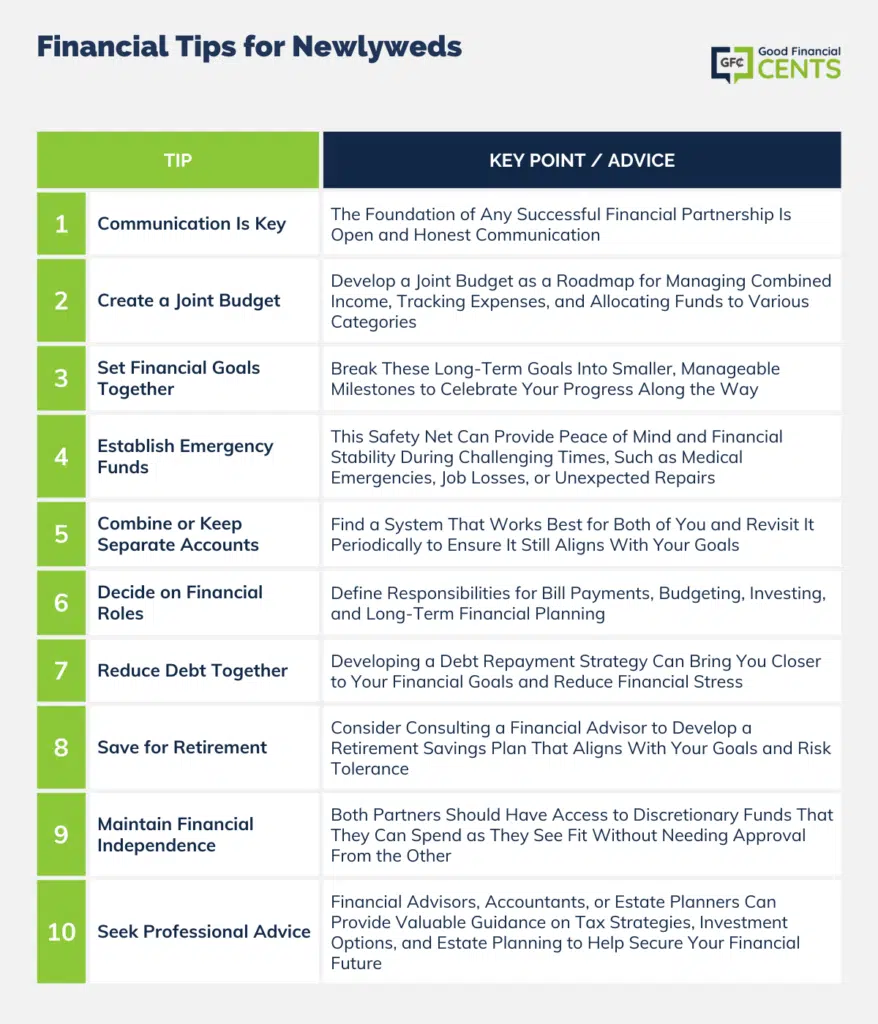Newlyweds embark on a journey of love, partnership, and shared dreams. While the honeymoon phase may be filled with bliss, it’s essential to recognize that love and money are two intertwined aspects of any marriage. Managing finances together can be both rewarding and challenging, as it requires open communication, trust, and a shared vision for the future. In this article, we will explore some comprehensive financial tips for newlyweds to help them navigate this crucial aspect of their married life successfully.
Table of Contents
Communication Is Key
The foundation of any successful financial partnership is open and honest communication. Before you merge your lives, it’s crucial to discuss your financial goals, values, and expectations. Sit down and have a candid conversation about your income, debts, spending habits, and financial aspirations. By understanding each other’s financial backgrounds and perspectives, you can create a solid financial plan that aligns with both of your goals.
Create a Joint Budget
Once you’ve had a thorough discussion, it’s time to create a joint budget. A budget serves as a roadmap for managing your money as a couple. List your combined income, track your expenses, and allocate funds to various categories like housing, groceries, utilities, entertainment, and savings. Be realistic and flexible in your budgeting approach, allowing room for unforeseen expenses or adjustments as your financial situation evolves.
Set Financial Goals Together
Setting common financial goals can be incredibly motivating and unifying for newlyweds. Whether it’s saving for a down payment on a house, planning for a family, or traveling the world together, having shared objectives helps you stay focused and committed to your financial plan. Break these long-term goals into smaller, manageable milestones to celebrate your progress along the way.
Establish Emergency Funds
Life is unpredictable, and having an emergency fund is essential to weather unexpected financial storms. Aim to save at least three to six months’ worth of living expenses in a separate, easily accessible account. This safety net can provide peace of mind and financial stability during challenging times, such as medical emergencies, job losses, or unexpected repairs.
Combine or Keep Separate Accounts
One common question for newlyweds is whether to merge all finances into joint accounts or maintain separate accounts. The choice largely depends on your personal preferences and financial situation. Some couples find that combining all income and expenses into joint accounts simplifies finances and fosters transparency. Others prefer to maintain separate accounts for personal spending while maintaining a joint account for shared expenses. Find a system that works best for both of you and revisit it periodically to ensure it still aligns with your goals.
Decide on Financial Roles
In many marriages, one partner takes on the role of managing the finances, while the other may focus on other aspects of the household. It’s crucial to discuss and agree on these roles to prevent misunderstandings or resentment. Clearly define responsibilities for bill payments, budgeting, investing, and long-term financial planning. Regularly check in with each other to ensure both partners feel involved and informed about their financial situation.
Reduce Debt Together
Debt can be a significant burden on a marriage. If either or both partners bring debt into the marriage, create a plan to address it together. Prioritize paying off high-interest debts, such as credit card balances, and work as a team to reduce and eliminate these financial obligations. Developing a debt repayment strategy can bring you closer to your financial goals and reduce financial stress.
Save for Retirement
Retirement planning is a long-term financial goal that should not be overlooked. Begin saving for retirement early in your marriage, taking advantage of employer-sponsored retirement accounts, like 401(k)s, and individual retirement accounts (IRAs). Consider consulting a financial advisor to develop a retirement savings plan that aligns with your goals and risk tolerance.
Maintain Financial Independence
While managing finances together is crucial, it’s also essential to maintain a degree of financial independence. Both partners should have access to discretionary funds that they can spend as they see fit without needing approval from the other. This can help prevent feelings of control or resentment and allow each spouse to maintain a sense of autonomy.
Seek Professional Advice
If you encounter financial challenges or complexities beyond your expertise, don’t hesitate to seek professional advice. Financial advisors, accountants, or estate planners can provide valuable guidance on tax strategies, investment options, and estate planning to help secure your financial future.

Conclusion
Love and money are inextricably linked in a marriage, and effective financial management is crucial to building a strong and lasting partnership. By fostering open communication, setting joint goals, and working together on budgeting and financial planning, newlyweds can navigate the complexities of their financial lives with confidence and unity. Remember that financial success in marriage is not just about amassing wealth but also about building a foundation of trust, shared values, and mutual support that will sustain your love and financial well-being for years to come.








I would recommend having the “finance talk” before the nuptials. Go in with a good understanding of where you stand and where you want to go as a couple. Surprises after the “I do’s” just adds to the already whirl wind of getting married.
Great article…my wife and I after 3 years have definitely settled into a great routine that works out well. She is in charge of paying the bills and I am in charge of strategy/system. We both have our spending limits at around $500 with no consultation (not hard and fast but its a decent guideline).
This article is super helpful! The “money talk” is something that can’t be avoided since, when you do get married, each person’s financial history affects each other’s records. The calculator is very helpful as well. Will definitely need to share this article. Thanks so much for sharing these tips with us!
This is an awesome post. Thanks for sharing. My boyfriend and I have started to have the financial conversation. This gave me much needed insight! Thanks again!
Great article, I’d almost suggest going even further in terms of discussing attitudes to investment, early retirement and financial goals. Getting alignment on some of the big picture visions will help ensure that you’re both rowing together instead of in separate directions.
Lot’s of good tips in this post. My wife and I decided to combine all of our finances together when we got married. We believe we became one in marriage and our finances should to. I think one person in most relationships tends to emerge as the CFO, but both should participate in the overall management of the finances. While I track our expenses in budgeting software, we work together to set goals and review our budget regularly. I still feel like managing the family finances is like running a small business. It’s not easy, but worthwhile to go at it together.
These are great tips. This was something my husband and I talked about before we were married. We rarely argue, and when we do it’s not about money!
I couldn’t agree more. My fiancee and I went to a counselor shortly after getting engaged and took a compatibility test so we could work on any potential issuers now (rather than later… which might mean when it’s time for a divorce…) Fortunately we’re 100% in agreement on financial matters, and we have a few new ideas on how to communicate better on other things.
Definitely talk about money as much as you can (okay, not literally, but often). We try and talk about our goals and what we want out of everything.